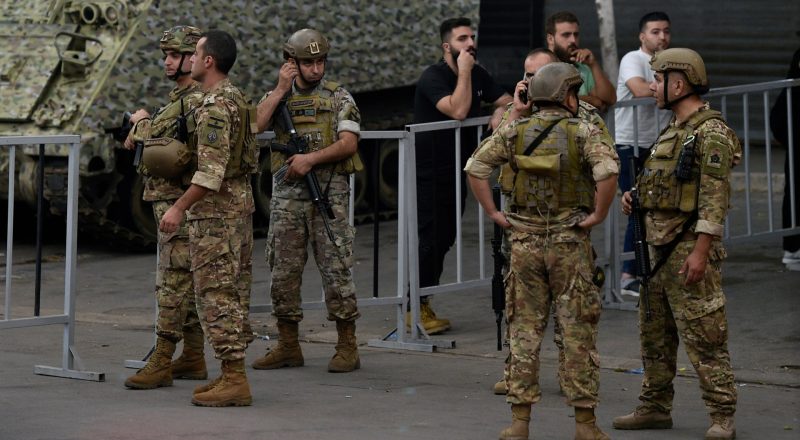LEBANESE troops immediately pulled back from the border as Israel launched its ground offensive in the south of the country.
The move indicates the Lebanese Army was stepping aside to allow the bloody showdown between Israel and Hezbollah to kick off.
Troops from the Lebanese Army withdrew three miles from the Israeli border, according to military sources.
Lebanon’s army – which operates independently of more powerful Hezbollah forces – has historically stayed on the sidelines of major conflicts with Israel.
Israel launched Operation Northern Arrows last night with troops and tanks storming southern Lebanon.
The IDF described the offensive as “limited” and “localised” ground raids against Hezbollah terrorist targets and noted it is not a war against the Lebanese people.
It comes as…
- Elite IDF paratrooper & commando units launch ground invasion in Lebanon
- ‘Fierce’ clashes erupt between IDF troops and Hezbollah terrorists
- Israel declares no-go zone for Lebanese civilians south of the Litani River
- Israeli jets launch airstrikes on Beirut and southern towns in Lebanon
- Israel vows to ‘crush Hezbollah’ after launching ‘Northern Arrows’ invasion
- Hezbollah fanatics launch retaliatory rocket strikes against Tel Aviv
- UK Government charters emergency flight out of Lebanon for fleeing Brits
Military spokesperson Rear Admiral Daniel Hagarisaid: “These localized ground raids will target Hezbollah strongholds that threaten Israeli towns, kibbutzim and communities along our border.
“Hezbollah turned Lebanese villages next to Israeli villages into military bases ready for an attack on Israel.”
Israel also warned Lebanese civilians not to drive in the area due to “intense fighting.”
Spokesman Avichay Adraee said: “Intense fighting is taking place in southern Lebanon.
“For your personal safety, we ask you not to travel by vehicles from the north to the south of the Litani River.”
Tanks and military trucks have also been seen transported towards the border over the past few days.
The IDF revealed planning has been going on for months and was only launched after approval by political leaders.
They said: “The IDF began a few hours ago a targeted and demarcated ground operation in southern Lebanon against terrorist targets and infrastructures of the terrorist organisation Hezbollah.”
The Israeli Defence Force (IDF) pledged they will fight the Iran-backed paramilitary group “until victory”.
Israeli defence minister Minister Yoav Gallant told troops deployed to the country’s northern border: “We will use all the forces from the air, sea and land”.
Hezbollah’s deputy chief Naim Qassem today insisted the terror group is ready for any Israeli ground offensive.
He vowed Hezbollah would continue with its mission against Israel despite the loss of its leader and other top brass.
Qassem said: “We will not budge an inch from our position in supporting Gaza and Palestine and defending Lebanon and its people.
“We know that the battle is long and the options are open to us, and we are ready for the enemy to enter by land, as the resistance forces are ready for the ground encounter.”
Hezbollah’s decade of destructive preperation

By Foreign News Reporter Juliana Cruz Lima
Following the 2006 Lebanon War, in which Israel and Hezbollah fought to a bloody standstill, the terror group began preparing for the next conflict.
They constructed a vast underground network across southern Lebanon.
The lessons of that war, in which Hezbollah’s small, mobile units were able to surprise and sometimes overpower Israeli forces, have been embedded in its military doctrine ever since.
The tunnels are now a key part of this strategy, allowing Hezbollah to replicate the tactics of insurgencies around the world: strike fast, disappear, and use the enemy’s size and strength against them.
Some of these tunnels have been found stretching into Israeli territory, designed to facilitate surprise raids deep inside northern Israel.
In 2018, the IDF launched Operation Northern Shield, a months-long mission to detect and destroy Hezbollah’s cross-border tunnels.
The discovery of these tunnels — some reinforced with concrete and running dozens of meters underground — revealed just how advanced Hezbollah’s capabilities had become.
Last month, Hezbollah revealed its hidden terror tunnel network from which missiles can be launched in a chilling threat to Israel.
A blood-curdling video released by the Lebanese terrorists revealed a giant underground roads with enough room for lorries to transport their deadly weapons.
Posters of leaders and soldiers adorn the tall stone walls as heavily armed men speed through the “missile city” in motorbikes.
Trucks loaded with enormous missiles make their way through the dark roads in a frightening glimpse of the terrorists’ arsenal.
Drone footage then shows the seemingly endless terror maze, which also appears to be home to military tech and computers.
Inside the terror tunnels, Hezbollah fighters can move unseen, store weapons, and launch ambushes, creating a dangerous cat-and-mouse game with the IDF.
They can also move into a much larger network of bunkers, missile silos, and command centres, deeply embedded in civilian areas.
These tunnels – which can stretch for miles – link critical positions, allowing Hezbollah fighters to emerge, strike, and then vanish back underground before Israel can respond.
Reports also suggest that Hezbollah has been expanding its tunnel network in southern Lebanon in recent weeks.





